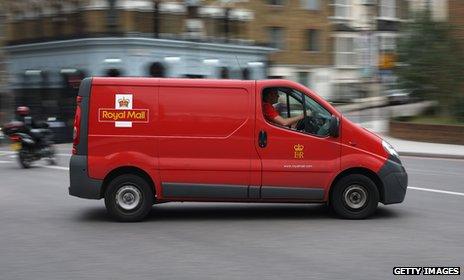Was Royal Mail sold too cheaply?
- Published
- comments

With £27bn of investors' money having chased shares priced at just £1.7bn, and with Royal Mail's share price trading at more than 450p this morning, compared with the 330p a share the government is receiving, there is a certainly a case for saying the government could have got more.
And just to put this in slightly more concrete terms, at 330p the government is receiving a fraction under £2bn, if (as is very likely) its bankers exercise what is known as the over-allotment option (if you really want to know more about this, see me after class).
However if the shares had been priced at around this morning's market price, at say 450p, the Exchequer would have received £2.7bn.
So should taxpayers be raging that they've lost a potential windfall of £700m, which would not have paid off the trillion pound national debt but would have paid for a couple of miles of High Speed 2?
There are a number of things to say about this. And the first is that pricing is more art than science, and no vendor of a large number of shares will ever get the best price available.
Also the price range for the privatisation shares was set by the government at a time when prevailing opinion was that this was a risky declining business hobbled by lamentable industrial relations; it was only in the course of the share sale that investors noticed a parcels operation growing very nicely, an endowment of potentially valuable properties in city centres and the fat income the company is promising to pay shareholders.
What is particularly striking is that Royal Mail's own people are confident that they are in a business that will prosper: I have learned that 15,000 Royal Mail employees, almost a tenth of the workforce, have paid £52m to buy Royal Mail shares (in addition to the free shares being handed to all Royal Mail employees).
However, what some may think is odd - including, presumably, ministers - is that investors have completely ignored the risk that Royal Mail could imminently be brought to a grinding halt by a strike. The frenzy to buy Royal Mail shares probably tells you quite a lot about the extent to which better-off people think the economy is recovering - which the government is not going to rage about.
That said, a 36% gap between market price and privatisation price is far wider than would normally be thought necessary to whet punters' appetite for future privatisations (remember that the Department for Business Innovation and Skills has another 30% of Royal Mail to flog, probably next summer, so ministers would not want to burn investors buying in this initial share offer).
So something does seem to have gone a bit cock-eyed with the sale. What?
Well the privatisation prospectus explicitly allowed the government to revise the sale price up, outside of the indicated range, if demand for the shares turned out to be much greater than expected. With big investment institutions putting up money for the shares worth 20 times what was on offer to them, and retail investors bidding for seven times what was available, it is fair to say demand was greater than anticipated.
So why did the relevant ministers, Vince Cable and Michael Fallon, sell at the top of the indicated range, rather than breaking through that threshold?
They had what they regard as non-partisan advice, from the investment bank Lazards - which was not involved in actually placing the shares, and therefore had no vested interest, in theory - that 330p was a fair price.
And that advice was apparently underwritten by the government's own internal counsellor on these issues, the UK Shareholder Executive.
But, that said, Cable and Fallon are grown-ups and know that ultimately the buck stops with them: advisers advise, ministers decide.
So they know that if the share price stays at this level for weeks and months, they will be vulnerable to criticism - and, probably, to a ticking off by the National Audit Office.
But Vince Cable has already made clear that he thinks the market is wrong to price the shares at these levels, by talking about the need to wait until the "froth" has been blown off.
Or to put it another way, he and Fallon assume that Royal Mail shares will be back near the offer price before Christmas.
Which points towards the most delicious political spat I've seen in a long time.
Labour's spokesman on all this, Chuka Umunna, in chastising Cable and Fallon for allegedly selling Royal Mail too cheaply, has in effect been shouting - at the most sensitive period of privatisation - "the government is selling five pound notes for 50p, fill your boots."
Whereas the capitalist Tory Fallon and leftish Lib Dem Cable have been saying to retail investors, "I'd take care if I were you, this stock-market game can be a bit dangerous."
So what is quite striking is that 700,000 people with a bit of money to spare voted Umunna, by stampeding to apply for the shares - though whether they are natural Labour supporters is another thing altogether.
Here is the intriguing political calculation.
If Royal Mail shares stay at these levels, the government may well in time be found guilty of having privatised the company too cheaply.
But ministers have just delivered a tidy windfall of £187m to 690,000 people who've been allocated £750 of shares each. That is a potential profit of almost £250 for each of them.
Which is a fair number of people who are probably prepared to buy Fallon and Cable a drink.